Atrial Septal Defect (ASD) Closure in India is affordable and performed by top cardiac surgeons at world-class hospitals with complete patient care support.
Recovery Time
2 Weeks
Success Rate
95%
Hospital Stay
3 Days
Treatment Type
Both Surgical and Non-surgical
Home Treatments Pediatric Cardiology Atrial Septal Defect (ASD) Closure
The cost of atrial septal defect (ASD) closure surgery in India is between 3,200 and 4,500 USD. The success rate is around 95%, and the hospital stay is usually about 3 days.
If you have symptoms like shortness of breath, palpitations, and fatigue, and if you are at risk of complications like stroke, this surgery can help improve your condition.
An atrial septal defect (ASD) is a hole in the wall between the two upper chambers of your heart.
India offers affordable and high-quality atrial septal defect (ASD) closure surgery. The cost depends on the hospital, the surgeon’s experience, and how complex your case is. Also, this is one of the common pediatric heart surgeries performed in India.
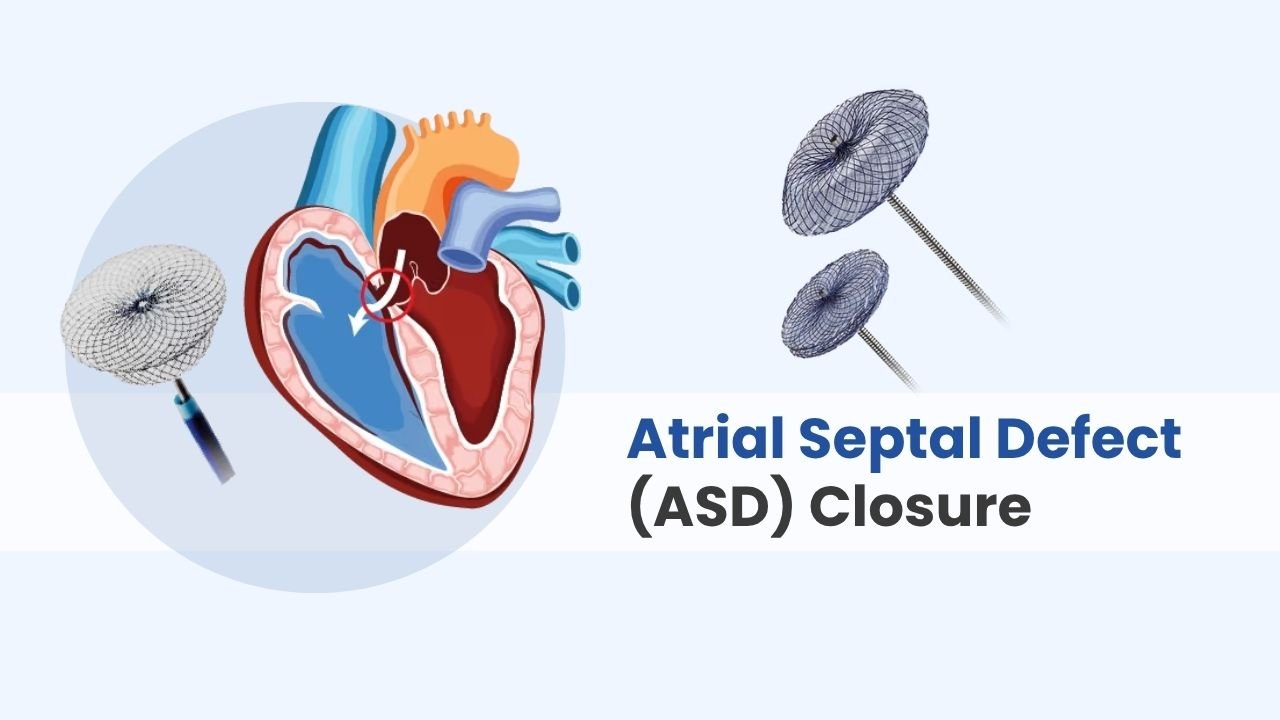
An atrial septal defect (ASD) is a hole in the wall between the two upper chambers of your heart, known as the atria, and this wall is called the septum. When a baby’s heart is forming during pregnancy, it is normal for small openings to be present in this wall. Usually, these openings close before birth or soon after the baby is born. But sometimes, one of these openings doesn’t close properly, leaving a hole.
The size of the hole can be small or large. In some cases, the hole may close on its own as the child grows. But if it is large and doesn’t close, doctors may need to fix it with surgery.
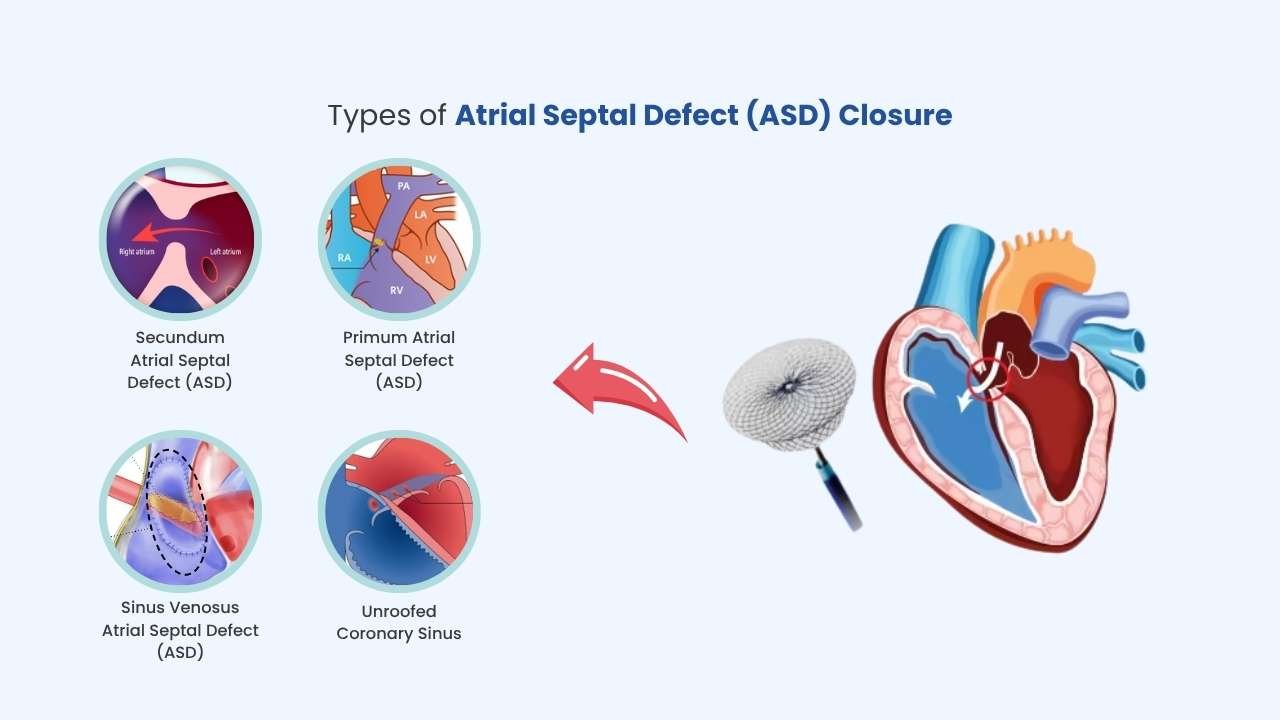
There are four main types of atrial septal defects (ASD), and these are birth defects where there is a hole in the wall that separates the two upper chambers of the heart.
• Secundum Atrial Septal Defect (ASD)
This is the most common type of ASD in which the hole is in the middle of your atrial wall, in an area called the fossa ovalis, and it happens because the part of the wall that should have closed during development in the womb did not form properly. This type of hole helps blood to flow abnormally between the left and right atria.
• Primum Atrial Septal Defect (ASD)
Primum atrial septal defect occurs lower in the septum, near the tricuspid and mitral valves, and it is part of a larger group of heart defects called atrioventricular septal defects. Apart from the hole, the valves between the heart chambers may also not work properly, which causes leaking.
Sometimes, there may also be a hole in the lower wall of your heart known as a ventricular septal defect.
• Sinus Venosus Atrial Septal Defect (ASD)
This is a rare type of ASD and the hole is high up or low down in the atrial wall, where the large veins connect to your heart. It is caused by a problem in how this part of the heart formed during early development. Sometimes, the veins from the lungs may also connect incorrectly to the heart.
• Unroofed Coronary Sinus
An unroofed coronary sinus is a rare type of atrial septal defect (ASD). Normally, the coronary sinus, which is a vein that collects blood from your heart muscle, is separated from the left atrium. In this condition, the wall between them is missing. This creates an abnormal opening between the coronary sinus and the left atrium. This type of defect often occurs with a persistent left superior vena cava (PLSVC), which is another abnormal vein connection.
This heart problem starts when a baby’s heart is developing inside the mother’s womb. However, some things that may increase the risk of this problem include:
Atrial septal defect (ASD) closure surgery can be done in two main ways such as open-heart surgery and a less invasive catheter-based procedure. However, open-heart surgery requires a larger cut in your chest, and the catheter-based method uses a thin tube inserted through a blood vessel in the groin to reach your heart.
Atrial Septal Defect (ASD) Closure cost
Treatment Name
Estimated Cost
Atrial Septal Defect (ASD) Closure 3200-4500 USD
The total cost of an atrial septal defect includes hospital charges for your stay, use of the room, and nursing care as well.
Cost Component | Details | Cost in USD |
Pre-operative Consultation & Diagnosis | Consultations, blood tests, X-rays, MRI scans, and CT scans. | 350 USD |
Surgery Costs | Includes hospital stays, surgeon fees, and the type of surgery. | 3200-4500 USD |
Rehabilitation and Follow-up | Medications, supportive devices, and follow-up visits. | Variable by Procedure |

Here are some important factors that affect the cost of atrial septal defect closure in India are as follows:
• Preoperative Care
Before starting surgery, doctors do some tests to check if the patient is healthy enough for surgery, and these tests may include X-ray, MRI scan, CT scan, blood tests, heart, lung, and kidney function tests, and endoscopy.
• Hospital and Location
Usually, hospitals in big cities and private hospitals charge more than hospitals in smaller towns. The cost also depends on how modern and well-equipped the hospital is.
• Surgeon’s Experience
Highly experienced and specialist surgeons, especially those who are well-known in the country and worldwide, charge more than less experienced surgeons.
• Length of Hospital Stay
If the surgery is complex and there are complications, the patient will need to stay longer in the hospital, which increases the total cost.
• Postoperative Care
After surgery, the patient may need a hospital stay, physiotherapy to regain strength, pain medicines and anesthesia, and follow-up visits to the doctor, treatment of any complications, all of which add to the overall cost.
Fill in your details and we'll get back to you soonGet Free Treatment Quote
The cost of an atrial septal defect in India is affordable as compared to other Western countries.
Country | Cost Structure |
India | 3200-4500 USD |
United States | 40,000-70,000 USD |
Germany | 25,000-40,000 USD |
Turkey | 10.000-18,000 USD |
◾Key Takeaways
✅ Affordable Treatment Cost
India provides affordable treatment options for atrial septal defect (ASD) with highly skilled cardiac surgeons. Making quality healthcare in India available to international patients.
✅ Advanced Medical Technologies
Hospitals in India have modern technology and advanced facilities. They provide high-quality care that is comparable to international standards at more affordable costs.
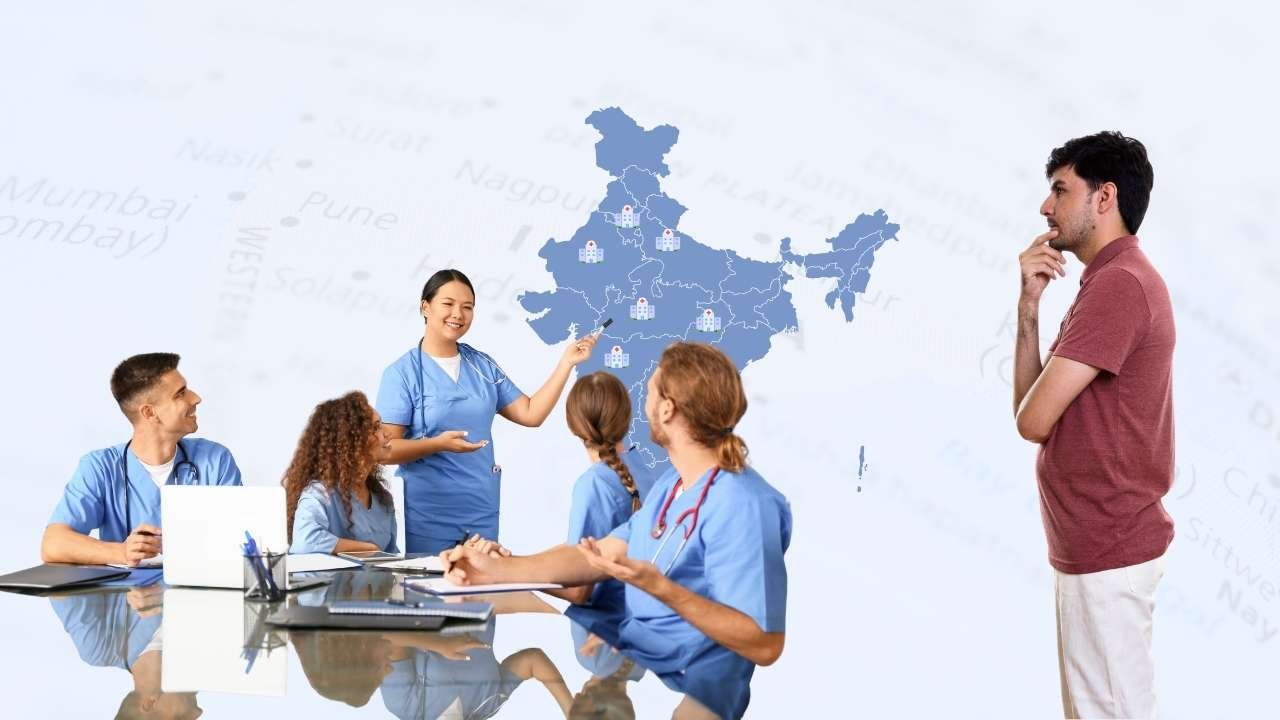
India has some of the best heart surgeons who have trained at top hospitals around the world. Many of them have many years of experience and are experts in doing complex heart surgeries.
Indian hospitals use modern technology like robotic surgery systems, advanced machines for tests, and catheterization labs, which help in giving better results.
Heart surgery in India is much cheaper than in countries like the UK, the US, and Australia. Surgeries like atrial septal defect (ASD) repair, coronary artery bypass graft (CABG), and open-heart surgery cost much less in India, without reducing the quality.
Indian hospitals offer all heart care services in one place, including heart surgery, rehabilitation, and care after surgery.
Doctors make treatment plans that are specially designed for each patient’s needs and health condition, which helps patients recover faster.
Because of affordable and high-quality heart treatment, people from different countries come to India for heart care.
Indian hospitals not only have the best heart doctors but also provide complete care during and after the treatment to help the patient recover smoothly and quickly.
Atrial septal defect is a common heart problem in children, and it happens in about 56 out of every 100,000 newborns worldwide and affects about 1.6 out of every 1,000 live births.
• Team of Top Cardiologists, Cardiac Surgeons
Our recommended doctors have over 25 years of experience in performing complex heart procedures, which means you will receive high-quality care from experts who understand your heart condition.
• JCI/NABH Accredited Hospitals
Mejocare partners with hospitals that are accredited by JCI and NABH, and these hospitals feature advanced facilities and the latest technologies, such as robotics, minimally invasive heart surgery, machine learning, and advanced diagnostic and therapeutic equipment, providing complete and personalized care.
• Other Benefits
We deliver fast, detailed responses, accurate cost estimates, and assistance with obtaining medical visas, as well as accommodation arrangements in India.
Furthermore, we prioritize your appointment scheduling and provide smooth arrival services, including airport pickup, hotel transfers, and full support during your hospital stays.
Indian doctors are highly skilled in performing complex heart surgery and provide effective treatments to help patients with advanced and specialized care.
Indian hospitals deliver innovative technology and high-quality care, and they also provide effective treatment and support recovery based on each patient.
Beds: 539
New Delhi
Beds: 230
New Delhi
Beds: 710
New Delhi
Beds: 650
New Delhi
Beds: 191
New Delhi
Beds: 310
New Delhi
Beds: 330
Gurugram
Beds: 380
New Delhi
Beds: 402
New Delhi
Beds: 1300+
Gurugram
Beds: 1000
New Delhi
Beds: 450
Faridabad
Beds: 675
New Delhi
Beds: 500
New Delhi
Beds: 400+
Faridabad

Max Super Speciality Hospital, Saket

Aakash Healthcare Super Speciality Hospital

Indraprastha Apollo Hospital

BLK Max Super Speciality Hospital

Dharamshila Narayana Superspeciality Hospital

Fortis Escorts Heart Institute

Fortis Memorial Research Institute

Manipal Hospital Dwarka

Max Super Speciality Hospital Shalimar Bagh

Medanta - The Medicity Hospital

Moolchand Kharaiti Ram Hospital

Sarvodaya Hospital

Sir Ganga Ram Hospital

Venkateshwar Hospital
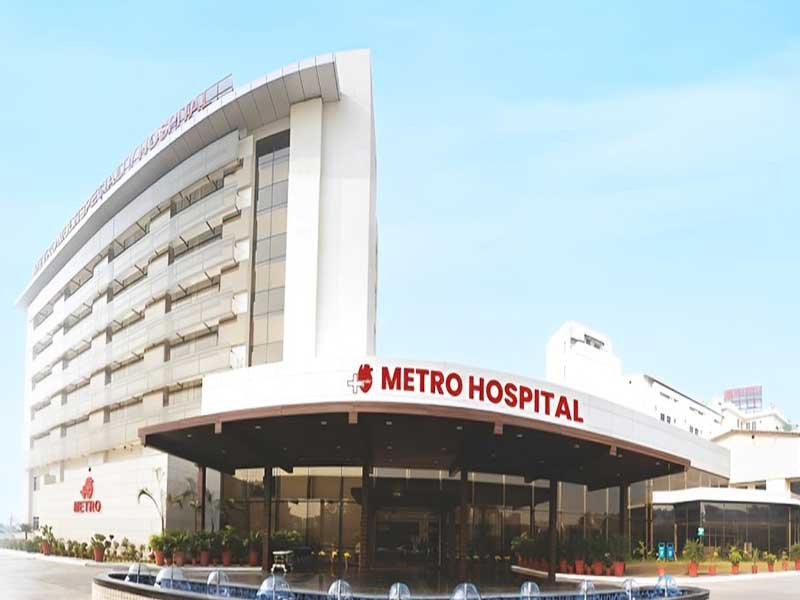
Metro Heart Institute with Multispecialty
Disclaimer
Given details in this article are only for general purposes; it doesn’t aim to provide an exact cost estimate. If you are seeking professional opinions and exact cost instructions, we can help you connect with India’s top surgeons. Contact Mejocare now.
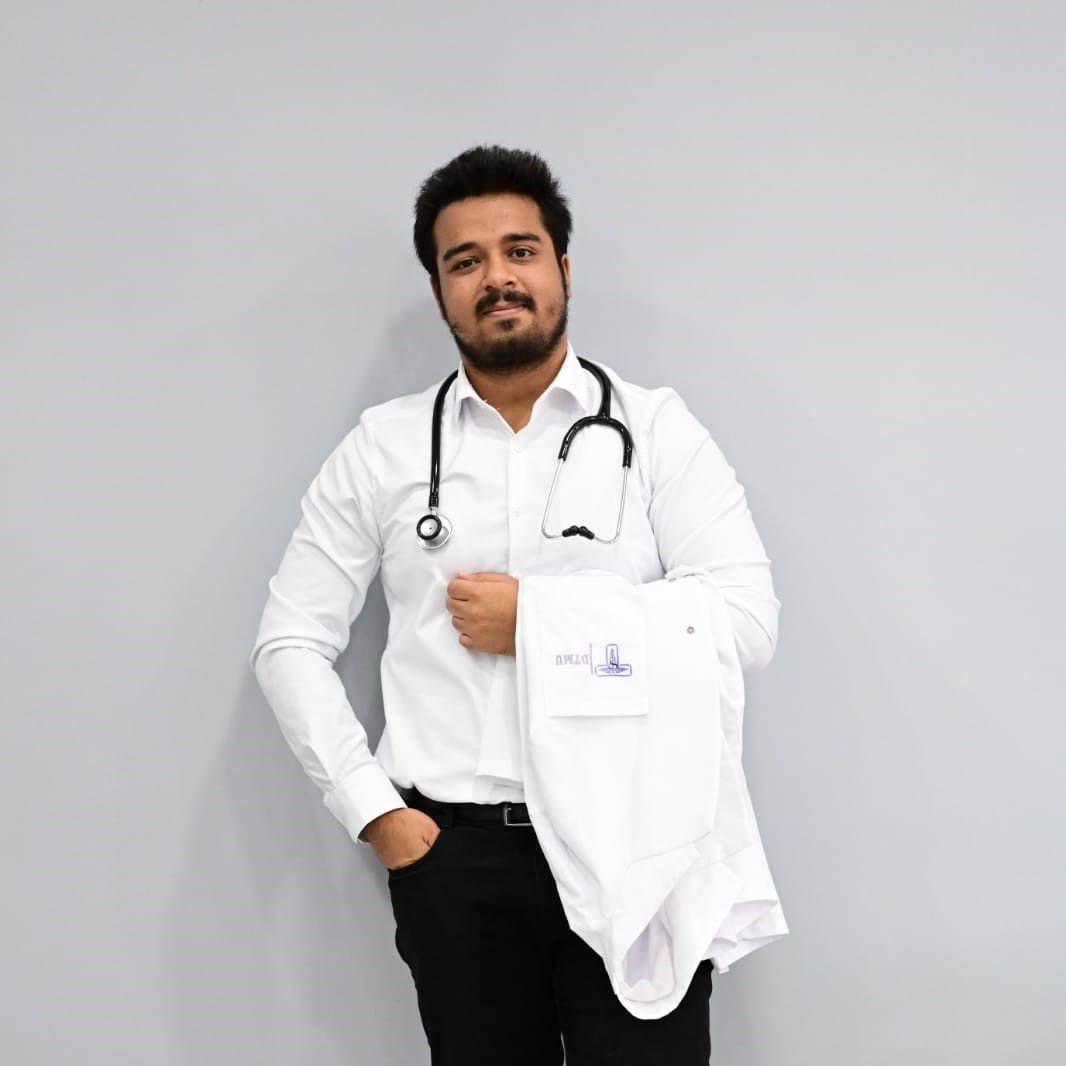
Medically Reviewed By
QualificationsMBBS, DTMU University, Georgia.Radiation Oncology Resident at Burdwan Medical College and HospitalDr. Aryan Malhotra is a skilled and caring doctor. He is a Radiation Oncology Resident at Burdwan Medical College and Hospital. He treats people with cancer and works closely with patients during their treatment.He completed his MBBS from David Tvildiani Medical University in Georgia. He has passed the USMLE... Read More
Registration Number: 95565
Qualification: MBBS, MD from DTMU University, Georgia, Radiation Oncology Resident at Burdwan Medical College and Hospital
ASD Device Closure is a procedure performed to close an atrial septal defect (ASD), which is a congenital hole between the two upper chambers of the heart.
The average cost of atrial septal defect (ASD) closure in India ranges from 3,200 to 4,500 USD.
The success rate of atrial septal defect (ASD) closure in India is 95%.
Generally, the left side of the heart only pumps blood to your body, and the right side of the heart only pumps blood to your lungs. In a child with ASD, blood can travel across the hole from the left upper heart chamber to the right upper chamber and out into the lung arteries.
A patient needs to stay in the hospital for an atrial septal defect (ASD) is 3 days as well.
Atrial septal defect (ASD) Closure is often suggested when the defect causes symptoms like shortness of breath, fatigue, and palpitations, also if there is a risk of serious complications such as stroke and heart failure.
Atrial septal defect (ASD) closure has various benefits as compared to traditional surgical methods, like it is a minimally invasive method, which means shorter hospital stay, lower risk, and faster recovery.
Atrial septal defect (ASD) closure is generally safe, but there are some risks, including
infection, blood clots, device migration, and failure to close the defect.
Atrial septal defect (ASD) closure, especially in childhood, generally leads to excellent outcomes and reduced long-term complications, as individuals who undergo ASD closure have a life expectancy similar to those who never had an ASD, and regular follow-up with a cardiologist is important to your heart's health and ensures the closure remains effective.
Atrial septal defect (ASD) treatment will depend on a child's age, size, location, and severity of the defect. However, very small ASDs might not need any treatment.
Our care team can help you.
